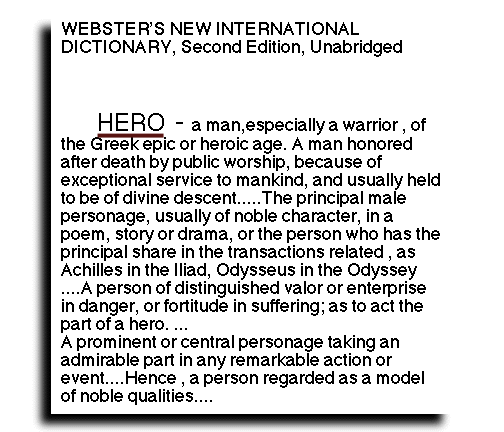
Both past and Contemporary
Throughout time, society has had those which it idolizes.
These, it defines as its heroes.

As shown, the definition of a hero summarized in the last paragraph, is a model of noble qualities. The society in which those same values are being modeled must set these values for itself. Thus, in order for contemporary, modern America to have heroes, it must first define its standards.
The media portrays many things as noble; charicteristics valued are those such as caring, loving, intelligence, and ability to make critical decisions in time of crises. These charicteristics are portrayed in the "winners" in our movies, and as the ideal role model in our portrayal of our American history.
Not only has America set its standards for a role model, but so have the societies of the ancient Greeks and Civil War Time northern America. The Greeks define the lead character of Homer's Odyssey, Odysseus, as a hero. His ability to fight made him valuable, and this asset was something that they wished to convey to their children; thus through the creation of a hero, they can influence their offspring for the "better" and teach them a value that they have found important. Huckleburry Finn, as portrayed by Mark Twain, was also a hero to many northern abolitionists of Civil War time America, because he was able to stand up for his beliefs and make critical decisions in times when he was forced to confront moral dilemmas (his crises). These two heroes of the past compare with the hero of contemporary America in the respect that they all posess characteristics that the society that creates them values their character traits. However, should Odysseus be placed in the context of modern day America, he would be arrested by the police. Thus, a hero is only a hero in his/her own context.